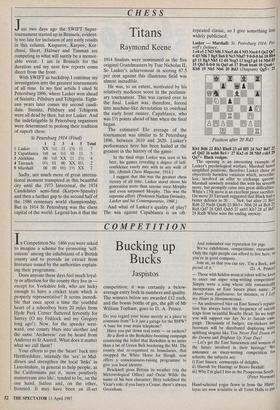CHESS
Titans
Raymond Keene
Just two days ago the SWIFT Super- tournament started up in Brussels, evident- ly too late for inclusion of any early results in this column. Kasparov, Karpov, Kor- chnoi, Short, Hubner and Timman are competing in what will surely be a memor- able event. I am in Brussels for the duration and my next few reports come direct from the front.
With SWIFT as backdrop I continue my investigation into the greatest tournaments of all time. In my first article I cited St Petersburg 1896, where Lasker won ahead of Steinitz, Pillsbury and Tchigorin. Eight- een years later comes my second candi- date. Steinitz, Pillsbury and Tchigoriri were all dead by then, but not Lasker. And the indefatigable St Petersburg organisers were determined to prolong their tradition of superb chess: St Petersburg 1914 (Final)
1 2 3 4 5 Total 1 Lasker XX V21 11 11/2 11 7 2 Capablanca
1/20
xx 1/21 10 11 5 3 Alekhine 00
V-20
XX 11 11/2 4 4 Tarrasch 01/2 01 00 XX 01/2 2 5 Marshall 00 00 01/2 11/2 XX 2
Sadly, not much more of great interna- tional moment transpired in this beautiful city until the 1973 Interzonal, the 1974 Candidates' semi-final (Karpov-Spassky) and then a further gap to the second half of the 1986 centenary world championship. But in 1914 St Petersburg was the chess capital of the world. Legend has it that the 1914 finalists were nominated as the five original Grandmasters by Tsar Nicholas II. So Lasker's achievement in scoring 87.5 per cent against this illustrious field was almost incredible.
He was, to an extent, motivated by his relatively mediocre score in the prelimin- ary tournament. This was carried over to the final. Lasker was, therefore, forced into machine-like devastation to overhaul the early front runner, Capablanca, who was 11/2 points ahead of him when the final began.
The estimated Elo average of the tournament was similar to St Petersburg 1896, between 2610 and 2620. Lasker's performance here has been hailed at the greatest in the history of the game: • In the final stage Lasker was seen at his best, his games revealing a degree of 'Self- confidence rarely met with in any walk of life. (British Chess Magazine, 1914.) I suggest that this was the greatest chess victory of all time. Lasker stood above his generation more than anyone since Morphy and even surpassed Morphy. This was the supreme effort. (Professor Nathan Divinsky, Lasker and his Contemporaries, 1980.) And what of Lasker's quality of play? The win against Capablanca is an oft- repeated classic, so I give something less widely publicised:
Lasker — Marshall: St. Petersburg 1914; Pet- roff s Defence.
le4e52Nf3Nf63Nxe5d64Nf3Nxe45Qe2Qel 6 d3 Nf6 7 Bg5 Be6 8 Nc3 Nbd7 90-0-0 h6 10 BM g5 11 Bg3 Nh5 12 d4 Nxg3 13 hxg3 g4 14 Nh4 d5 15 Qb5 0-0-0 16 Qa5 a6 17 Bxa6 bxa6 18 Qxa6+ Kb8 19 Nb5 Nb6 20 Rd3 (Diagram) Qg5 + 21 Position after 20 Rd3 Kb! Bd6 22 Rb3 Rhe8 23 a4 Bf5 24 Na7 Bd7 25 a5 Qd2 26 axb6 Rel+ 27 Ka2 c6 28 Nb5 cxb5 29 Qa7+ Black resigns. The opening is an interesting example of Lasker's psychological warfare. Marshall hated simplified positions, therefore Lasker chose ao objectively harmless variation which, neverthe- less, involved an offer to exchange queens. Marshall unwisely avoided this with his seventh move, but promptly came into great difficulties. White's 17th move is an excellent piece sacrifice. On move 20 Tarrasch suggested that Black had a better defence in 20 . . . Nc4, but after 21 Rdl Rd6 22 Nxd6 Qxd6 23 Rb3+ Nb6 24 a4 Bc8 25 Re8 Qd7 26 Qb5 Qxb5 27 axb5 Kb7 28 a5 Bd7 29 Rxf8 White wins the ending anyway.
























































 Previous page
Previous page